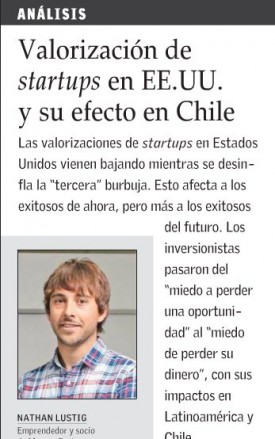A version of this article originally appeared in El Mercurio, one of Chile’s largest newspapers with the title Valorizaciones de startups en EE.UU. y su efecto en Chile. I write a monthly columns with the goal of helping Chileans understand what’s going on in the US startup market.
Many people have been talking about the “third tech bubble” in the US, including many investors like Mark Suster, Bill Gurley and Fred Wilson. At least up until now, the bubble’s been deflating, and hasn’t crashed. “Unicorns” have been the most strongly affected, but all startups are are affected when the most successful VC backed and public companies lose value.
VCs make the vast majority of their money by investing so that they can either sell their shares in the company in an acquisition, or currently less commonly, when the company goes public. If valuations for the “best” startups go down, the upper limit for startups that haven’t gotten to “the pay window” yet go down, at least in the short term. These startups then have to adjust their valuations lower at each step down the chain, as VCs are not as likely to pay high valuations of their ultimate upside looks to be lower, at least in the short to medium term.
…most VCs know by now and I suspect most entrepreneurs do not. That is simply because we see 20–25 deals / year across our funds (new and follow-ons) and entrepreneurs usually see 1 deal every 2 years.
It’s even more true in Latin America because Latin American entrepreneurs are more isolated, as they’re less likely to be reading startup blogs and talking with international entrepreneurs. Most investors in the US have changed from the FOMO (fear of missing out) mindset toward fear of losing money. There’s a renewed focus on companies that actually make sales and get cash flow positive, not just those that scale rapidly and need to burn millions (or billions) to get to profitability.
Latin American startups will experience positive and negative side effects of this correction in the US. On the negative side, it’s currently much more difficult for a Latin American startup to raise money in the US. It was already hard, but now it’s even more difficult. And if you do raise money, it will likely be at a lower valuation than it would have been a year ago. In meetings in San Francisco and LA, many investors have told me that valuations have fallen by up to 50% for early stage companies. Latin American valuations in Latin American will follow suit.
On the positive side, Latin American startups are much more capital efficient than their US counterparts, making them more competitive in a lower valuation environment. It’s never been easy to raise money in Latin American (and even harder in the US), so Latin American companies are used to operating without large rounds.
Latin American startups need to adjust to this new reality and focus on businesses that pass the common sense test, that can reach profitability and don’t require endless rounds of financing. If founders are able to raise money, they need to act as if it’s the last investment they’ll be able to get. If you’re a founder in Latin America, you need to internalize this advice and adjust accordingly. You must create something that, in the words of Steve Martin, is so good they can’t ignore you, especially in this shifting funding environment.
